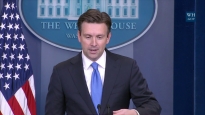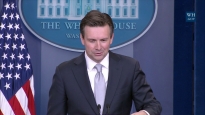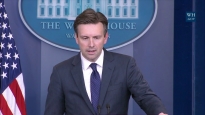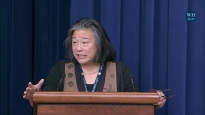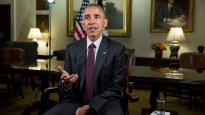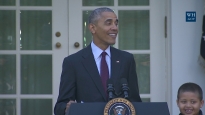Press Briefing
April 12, 2013 | 47:16 | Public Domain
White House Press Briefings are conducted most weekdays from the James S. Brady Press Briefing Room in the West Wing.
Press Briefing by Press Secretary Jay Carney, 4/12/2013
James S. Brady Press Briefing Room
12:25 P.M. EDT
MR. CARNEY: Welcome, everyone. Happy Friday. The thunderstorms of the morning have given way to sunny skies -- and augurs a beautiful weekend, I hope.
Q Very poetic.
MR. CARNEY: Before I take your questions, I wanted to let you know that as we continue to debate common-sense measures to reduce gun violence and save lives, one thing that has been very clear is that nobody has a more important or powerful perspective on the issue than the families who have lost loved ones because of the scourge of gun violence.
As you know, the President has been in regular contact this week with the families of victims of the 12/14 shootings, and he believes their voices and resolve have been critical to the continued progress we’ve seen in the Senate.
With that in mind, the President has asked Francine Wheeler -- who lost her 6-year-old son, Ben, on that terrible day -- to speak to the American people in this week’s Weekly Address.
With that, I will take your questions.
Q Was this the first time someone other than the President has done it -- not just this President -- in history? Is that your understanding?
MR. CARNEY: I can’t speak for previous administrations. It is the case that in this administration, the Vice President delivered the Weekly Address when I was working for him, but I don’t know about past administrations.
Jim.
Q Thank you, Jay. I wanted to ask about North Korea and developments that emerged after the briefing yesterday -- reports that North Korea could have weapons capable of delivery by ballistic missiles, even though reports said the weapon itself might be unreliable. How much of a concern is this to the President? And given the unpredictable behavior by North Korea’s leader, even if weapons aren’t fully developed, is there a danger that this guy could actually act on something that’s not been tested?
MR. CARNEY: Well, first of all, I want to be clear that North Korea has not demonstrated the capability to deploy a nuclear-armed missile. The United States continues to closely monitor the North Korean nuclear program, and calls upon North Korea to honor its international obligations.
So I just want to be clear, out of -- in response to your question, that it is our assessment that North Korea has not demonstrated the capability to deploy a nuclear-armed missile. To your broader question, we have responded to the series of provocative actions as well as the stepped-up bellicose rhetoric emanating from Pyongyang by taking a series of prudent measures to ensure that our homeland and our allies are defended. That includes steps to enhance our missile defense system as well as a variety of other measures that we’ve taken and that have been reported on. So we take this seriously.
It is, as I’ve said in the past, reminiscent of past periods of provocative actions and increased bellicose rhetoric. There is a pattern here that we have seen in North Korean behavior, and this is reminiscent of that pattern. But there is no question that this is a situation that requires the United States to take the necessary prudent measures, and that’s what we’ve done.
Q And I know you’ve said that it follows a pattern, but is the rhetoric -- the level of activity going significantly beyond where the rhetoric has gone in the past? And is that in itself --
MR. CARNEY: Well, I would not characterize it that way. I think a familiarity with some of these past cycles would suggest that the rhetoric is in keeping with, by and large, past behavior. But, clearly, we are in a different time, and it is clear that having tested a nuclear weapon under the previous administration, North Korea has continued to flout its international obligations with regards to the commitment to denuclearize the Korean Peninsula, and it has continued to flout its international obligations when it comes to development of missile technology.
So we are where we are in regard to that. But the kinds of behavior and actions fit a pattern. But because of what we have seen out of North Korea, we have taken these prudent measures that I talked about.
Q What specifically are you -- is the U.S. -- the President's administration looking at in terms of the behavior from Kim Jong-un that would suggest further action on the part of the U.S.? In other words, movements -- you talked in the past that you hadn't noticed any personnel deployments, those kinds of things.
MR. CARNEY: Well, I don’t have any updates on that particular observation. When North Korea has, as it did not too long ago, taken an action that was flagrantly in violation of its commitments, we, with our fellow members of the United Nations Security Council, have acted, and acted unanimously just last month -- increasing sanctions on North Korea, taking other actions. And that process, of course, continues. And it isolates North Korea, punishes North Korea, if you will, for the behavior that is in direct violation of its obligations.
We say this making clear that there is an alternative path here available to North Korea -- a path that is open to them if the regime were to demonstrate a commitment to its obligations, a commitment to a process that would lead to the denuclearization of the Peninsula, which is the goal that we seek.
Jeff.
Q Thanks, Jay. Two issues. One is sort of a follow-up on North Korea. Tom Donilon is going to Russia I think this weekend. Is one of the main -- can you talk to us a little bit about what he'll be doing? And is one of the main issues there talking about missile defense in relation to North Korea?
MR. CARNEY: National Security Advisor Donilon is traveling to Russia, and he will be meeting with senior officials of the Russian government and discussing a range of topics that are important in our bilateral relationship. I imagine that North Korea will be one of the issues that he discusses in these meetings, but there are, of course, a number of other issues, very important matters that we regularly discuss with our Russian counterparts. So I would not say that this is limited to or a trip designed around the North Korean situation, but I'm sure that will be part of it.
As you know, and as I have said in the past, we have been discussing with the Russians, as well as the Chinese, what they can do to use their influence with North Korea to persuade North Korea to step back from some of the actions and rhetoric that we have seen from North Korea. They have, and China in particular has, unique influence with North Korea, which is an isolated country with not a great many communicants or others that -- nations that it communicates directly with. So that relationship between China and North Korea and also between Russia and North Korea is one that we hope can be utilized to bring about some change in behavior.
Q But aside from those talks, what about the missile defense piece? That's obviously something that has been a controversial issue between the U.S. and Russia. Does this conflict with North Korea create an opening there for a compromise on missile defense?
MR. CARNEY: I think you're conflating two separate issues. I think the issues that we have had and disagreements we've had with the Russians over missile defense has to do with our program in Europe, which is directed not at Russia but at a potential threat from Iran, as we've made very clear. And we continue to discuss that with the Russians. And we openly acknowledge the fact that we have disagreements with the Russians on this issue.
The nature of the relationship we have with Russia is that we acknowledge and deal with our disagreements, but we do not foreclose cooperation on issues where we agree. North Korea is a matter where we have similar feelings about the destabilizing nature of North Korea's recent behavior, and we have seen that in Russia's actions on the Security Council.
Q On one other issue, it's April and there are still a handful of Cabinet positions that have not been filled, both at the highest levels and at sort of the agency levels, including the FCC, the CFTC, a couple of commissioner positions at the FEC. Any updates on what's going on there?
MR. CARNEY: Well, Jeff, anytime you start a second administration there's a certain amount of turnover, there are a number of positions to fill. And the President has very deliberately gone through and made announcements when he is ready to fill openings in different places, including at the Cabinet Secretary level and at the agency level. We just saw unanimous confirmation of Mary Jo White, for example. That was an agency nominee.
The President is working on this and he will have announcements to a variety of posts when he is ready to make them. But obviously, he is working on them very deliberately.
I appreciate the question about the FCC, because I want to make clear that in his search for an FCC chair, the President is focused on finding someone who will build on the excellent work that Chairman Genachowski has done -- in particular, someone who is focused on promoting innovation, enhancing competition, encouraging investment, and protecting consumers. That is the frame that he is using as he looks for a replacement for Chairman Genachowski.
Q Does he have a deadline?
MR. CARNEY: The deadline that he has set for himself is to act when he has the right candidate to nominate.
Brianna.
Q On North Korea, when DNI Clapper says the North Koreans haven't fully tested a nuclear missile, what does he mean by “fully tested”? What does that mean?
MR. CARNEY: What it means is obviously the North Koreans have tested nuclear weapons and they have developed some missile technology. What they have not done is demonstrate a capacity to, a capability to deploy a nuclear-armed missile -- attach a warhead to a missile and fire it. There is no question that they continue to, in direct and flagrant violation of their commitments, to develop these programs. And we have seen them do that and they have suffered consequences for doing it.
But I think I would refer you to Director Clapper's statement, as well as the statement I believe out of the Pentagon, clarifying the view of the intelligence community with regard to this issue. There is no formal IC assessment that would suggest that the North Koreans have developed that capability.
Q But it doesn't seem very reassuring if you see what I mean --
MR. CARNEY: I do.
Q -- by saying they have the missile technology, they have the nuclear capacity, it's sort of a matter of combining them. That doesn't seem very reassuring. And what we're hearing from the administration is sort of it seems pretty scary, and you can understand why people are taking it that way.
MR. CARNEY: Well, I would say that this is obviously a matter of concern, as I was discussing earlier. And that is why we have taken the prudent actions that we have taken that have been reported on with regards to enhancing our missile defense to protect the homeland and our allies who might be affected by a North Korean action.
And I would simply say when it comes to assessments, these are very deliberate -- this is a very deliberate process. And while it might sound simple, it is not surely simple to take the next step. But make no mistake -- the North Koreans have thus far demonstrated a desire to continue along this path --
Q Where does the administration think they are in the process of being able to fire a nuclear --
MR. CARNEY: Well, they have clearly developed nuclear weapons, they have clearly developed --
Q But what is the concern that the accuracy, the aim -- that they couldn’t detonate it properly?
MR. CARNEY: Well, I’m not going to get into -- it would not be appropriate for me, nor --
Q Well, don’t you kind of have to -- I mean, if the cat is out of the bag here, to clarify it?
MR. CARNEY: Well, what I’m saying is -- I’m just simply echoing what the Director of National Intelligence said, which is that it is our assessment that they have not demonstrated this capability. And that’s an important point to make in light of some of the reporting this morning. But it is also -- you should not mistake that for any kind of -- anything but a serious concern about the actions and behavior and rhetoric that we’ve seen from North Korea -- which is why we have taken the steps that we’ve taken and will continue to work with both our allies in South Korea and Tokyo, as well as with our partners on the Security Council, the Chinese and the Russians, to try to bring about a change in behavior from the North Koreans, and to hopefully steer this process towards one that would lead North Korea to make an assessment that it is in their best interest, it is certainly in their people’s best interest to pursue a path of peace and stability on the Peninsula and denuclearization of the Peninsula in keeping with their obligations.
Q But if he said they haven’t demonstrated the capability, how have they not?
MR. CARNEY: When they test something, it is made known to the public and we make statements about it. I’m not going to get into very detailed intelligence assessments. I can tell you that it is the Director -- I’m just pointing you to his statement -- he is the top intelligence official in the land -- that they have not demonstrated this capability.
Ann.
Q Well, it seemed to come as a surprise to some members of Congress and the public. Can we assume it was not a surprise to the President that this was -- even though this is way down in the intelligence report, that that kind of information about possible capabilities was --
MR. CARNEY: Well, I’m not going to get into specific details of the briefings the President gets, but he has obviously been briefed regularly on North Korea throughout his presidency and with greater regularity of late.
Q On immigration, if the bipartisan plan is filed within the Senate next week -- the President said in his State of the Union address, send me immigration reform; I will sign it right away -- will he watch --
MR. CARNEY: It would have to meet his principles.
Q Yes. Will he watch the creation of the fine print in this legislation to make sure that there isn’t something in that? For instance, a start date or a cutoff date that he can’t accept?
MR. CARNEY: Well, we certainly look forward to reviewing legislation once it is produced. We have made clear that we are gratified by the progress. The President is encouraged by the progress being made in the Senate on bipartisan legislation that would comprehensively reform our immigration system. That is a goal the President set very clearly for achievement in this year, and he has encouraged the Senate and the Congress overall to move with haste towards that end.
But we will not -- we will make our assessments of the legislation and the fine print, as you say, once we have seen it, which, of course, since it's still being worked on, we have not seen it.
Q Well, doesn’t he then give Congress a tremendous amount of latitude in that he would probably not want to veto something over fine print here or there or --
MR. CARNEY: Well, first of all, you're speaking in hypotheticals about what may or may not be in it. You're suggesting that there will be objectionable things in it. I think it's better to wait and see.
I think what the President's principles are, are very clear. The fact that the Senate has pursued legislation that, broadly speaking, is in keeping with those principles is why you have seen the kind of consensus that we have seen thus far in the process, and we're encouraged by that. But the President made very clear that he believed that success was more likely if this process moved the way it has moved. And we will wait to see what the Gang of Eight produces, and provide assessments once they have produced that bill.
But we are encouraged by the progress. And we commend those members of that group for the work that they've done thus far, and look forward to the final product.
Q Let me pick up on that thread from Ann. How involved has either Cecilia Muñoz’s office or others here at the White House been in the Gang of Eight process? Do you have backchannel communications? I mean, when this comes out, is the White House going to be --
MR. CARNEY: If we had backchannel communications -- and we may or may not -- it wouldn’t be backchannel if I talked about them, would they?
Q Well, how involved has the White House been?
MR. CARNEY: Well, we have been absolutely engaged in providing information where we can. We have a lot of technological -- technical expertise. There have been bills -- this is a project that has been worked on, on several occasions in the last decade, or even less than that -- the last seven years. And we have been as helpful as we can be.
We are obviously extremely interested in this process. But I have no -- I'm not going to get into the weeds in terms of what kinds of meetings or communications --
Q You don’t expect to be surprised in total by what you see?
MR. CARNEY: Well, I would simply say that we're going to wait to see the legislation once it is a finished product and it has been produced. We have been encouraged by the progress that has been made and the progress that has been reported. And we, as the President has said all along, believe that the time is opportune to make this significant advance --
Q Right, but as this is being drafted, the White House has not been a bystander. You have been involved in answering questions, providing technical expertise, scoring, perhaps, on some provisions?
MR. CARNEY: Well, since you're quoting me on the technical expertise and the advice, I think I'll stick with that. But I don’t have any more detail to provide to you in terms of our role.
This is obviously something where, as the President had wanted, the Senate has taken the lead -- a bipartisan group of senators has taken a lead -- and that is a welcome thing. And hopefully, it will produce a bill from the Gang of Eight and then a bill that moves through the Senate that enjoys broad bipartisan support, and that meets the principles -- and I think the two are likely to be the same in many ways -- and meets the principles that the President has put forward in the blueprint that’s been available to the public for so long now. The point being that a bill that achieved that broad bipartisan support, we believe, the President believes would likely meet his principles.
But we are not there yet. And I think that while we have seen progress on this, and we have seen progress recently -- very important progress recently on legislation to reduce gun violence -- we cannot let up as a country or as legislators or members of the administration, because this work is far from done, and these are hard things. They have been goals for a long time that have not been achieved for a reason -- because they’re hard. So we have a lot of work to do, both here and on the Hill.
Q You’ve mentioned a couple of times prudent measures. I wonder -- because largely the context of that has been defensive things to protect allies or the United States. But I wonder if there’s also another aspect to prudent measures when you’ve got -- out of country today -- Secretary of State Kerry said, “President Obama has ordered a number of exercises not to be undertaken…for reasonableness to prevail here.” And I wonder if some of the prudent measures the President has undertaken in the most recent days have been to, in this case, cancel exercises that had been planned or delay them or do something else to take either theoretically provocative action or actions that might be misinterpreted out of the mix.
MR. CARNEY: What the Secretary was referring to was not the cancellation of exercises. He was referring, I believe, to what Secretary Hagel announced, which is that we postponed the April 9th Minuteman-III ICBM test, recognizing that it could be inaccurately construed by some as an attempt to exacerbate tensions on the Korean Peninsula. The test was previously scheduled, and is no way -- was no way, prior to its postponement, connected to recent events on the Peninsula. But in keeping with what you’re suggesting, in order to -- that it would not be misinterpreted as something in response to the situation on the Peninsula or something that would potentially exacerbate tensions on the Peninsula, Secretary Hagel postponed it. But it will be rescheduled.
Q But that’s the only thing that has been canceled or postponed in this pursuit of bringing down --
MR. CARNEY: I think that’s fair to say. I’m not familiar with all the different things that the Defense Department or others engage in with our South Korean allies, for example, or other measures that we take. But we did have recent, long-scheduled exercises that were undertaken with the ROK, and we obviously took other actions that are in specific response to what we have seen out of North Korea, including stepped-up missile defense actions and some of the over-flights that we had as well.
Yes.
Q Jay, in terms of your assessment of North Korea’s abilities -- when you were talking to Brianna -- Defense Secretary Hagel was asked yesterday at a hearing about both North Korea and Iran’s capabilities, and he was asked directly, do they both have the ability to reach the U.S. with long-range missiles? And the Secretary said neither has that ability now, but they both could down the road. My question is, does the White House share that assessment? And how do you calibrate the threats from not just North Korea but Iran as well?
MR. CARNEY: Well, I would echo what the Defense Secretary said and make the point that both countries have been in violation of their commitments. Both countries have refused to take steps to prove that they do not want to pursue nuclear weaponry. And we have taken a number of steps with regards to both Iran and North Korea to ensure the security of the United States and our allies.
We have said with regards to Iran that the window remains open for a diplomatic solution to be reached, but that window will not stay open forever. And that’s related to their efforts to develop the technology necessary for the kinds of threats that you suggest. We have eyes into their operations and we would know when there is what is described in the field as a breakout move. And at this time, in an assessment that’s shared by our allies, the window for diplomatic solutions remains open, as the President has said.
But I think these are obviously two nations that have flouted their obligations, that continue to pursue, in violation of their commitments, programs that represent threats to their regions and to the United States as well as our allies elsewhere.
Q The reason I ask the question is Richard Grenell, a Republican national security analyst, said today that he believes North Korea is a problem but that Iran is a more immediate threat; and that while you’re taking the prudent measures you mentioned earlier, in terms of moving missile defenses and whatnot to deal with North Korea, that the administration should be focusing just as hard or more so on Iran. How do you answer that criticism?
MR. CARNEY: Well, I’m not sure it’s a criticism. I would simply say that we have not taken any focus off of Iran. As you know, the President was in Israel recently, and that is a matter of concern that we share with the Israelis. And Iran was of course a top subject of conversation with the Israeli government and with the Prime Minister.
This is a concern that we share, and it is a concern that has led us to take actions that have created more international consensus with regard to Iranian behavior than has ever existed before; a sanctions regime that is unprecedented in history and has had very serious negative impacts on Iran. They have been paying a price for their behavior. And we continue a process that leaves open to Iran the opportunity to pursue a diplomatic resolution to this problem. But they have not chosen to do that, and the result has been stepped-up sanctions, stepped-up isolation, and international consensus that opposes the actions that they’ve taken.
Yes, Kristen.
Q Jay, thanks. Some foreign policy experts have suggested that China may have lost some of its influence when it comes to dealing with North Korea. Where does the President stand on that? Does he think that that’s the case?
MR. CARNEY: I wouldn’t want to qualify it. I think it is a simple fact that China, uniquely among nations, has a relationship that allows them to influence, potentially, the North Koreans. And that is why we have urged the Chinese to use that influence in a productive way that helps ratchet down tensions, that conveys the frustration reflected in the decision by the Chinese to vote in favor of the United Nations security resolution last month to the North Koreans, and that hopefully brings about a change in their behavior.
That’s an avenue that we, of course, believe is worth pursuing with the Chinese as well as the Russians. We are, of course, with Tokyo and Seoul and other allies, working to take other measures that address this problem. But I think that whatever the assessments are of the experts that you mention, there is still no question that China does have a relationship, I think, with North Korea that is unique and that allows for them to communicate their concerns in a way that other countries cannot.
Q So what specifically does the President want China to do or Russia to do at this exact moment? And is that happening --
MR. CARNEY: To join in the effort to try to persuade the North Koreans from provocative behavior and unhelpful rhetoric that destabilizes the situation. Ultimately, of course, we hope for an effort that convinces or persuades North Korea to engage in a process where they are committed to denuclearization of the Korean Peninsula, and that would allow them to take steps towards rejoining the international community and give them an opportunity to develop their economy, which is sorely in need of development. That as isolated as that nation is, the fact that its people suffer greatly under this regime because of the decisions the regime makes and how it spends its resources is well known.
Q And just one on the sequester. There’s obviously been a lot of attention on guns and immigration. I’ve been speaking to some families whose kids have gotten kicked off of the Head Start program. So how does the President prioritize that while dealing with guns and immigration? And is he -- obviously, he wrote it into his budget, but how does he keep the attention on that as well?
MR. CARNEY: Well, the President believes that the sequester was designed purposefully to be terrible policy by Democrats and Republicans, in the expectation that it never would become policy. And he --
Q But where does it fall on his list of priorities right now?
MR. CARNEY: I’m not sure -- the President has a series of priorities when it comes to our budget and fiscal challenges that are embodied in his budget that he announced just the other day. And as you know, that budget, if implemented, would eliminate the sequester, replace it with the kind of balanced, sensible deficit reduction measures that were originally envisioned when the Budget Control Act was written and the sequester was created. And he urges Congress to take action.
He had dinner the other night with a dozen Republican senators where -- among other subjects, including immigration and measures to reduce gun violence -- our budget challenges and fiscal challenges including the sequester were a subject, were a topic of conversation.
So this is very important. I think it is the case. And I think if you look at the regional coverage, you will find this even more so to be true, that people are being affected by the sequester. They're being furloughed. They're losing their jobs. They're having their wages cut. They're losing slots on Head Start. And this is the unfortunate result of a policy being implemented that was never supposed to be implemented. And the President certainly hopes that action is taken on the Hill to prevent that from happening further.
Q Yesterday, Jay, you and Secretary General Ban stated that the Syrian regime refused a U.N. team to investigate the chemical weapon allegations in Syria. And several U.N. diplomats yesterday told several journalists that we have "hard evidence" that chemical weapons were used in Syria. And also, Israeli ministers recently stated on the record that there were chemical weapons used. Since the U.N. team is rejected now, what is the next step? How are you going to move forward to work on these chemical allegations? Thank you.
MR. CARNEY: I will say that we have made clear our position on the potential use or proliferation by the Assad regime of chemical weapons. And we supported, and support, a United Nations-led investigation into the allegations that chemical weapons were used. The fact that the Assad regime has thus far prevented that investigation from occurring I think reflects the lack of seriousness of their initial call for an investigation and the suggestions that the Assad regime made that the opposition had used chemical weapons.
Now, I'm not making a declarative statement about that, but you heard us say at the time that we greeted with great skepticism those claims. And I think that if the Assad regime were truly interested in an investigation, they would not block an investigation.
Q So they blocked --
MR. CARNEY: Obviously, there's going to be more work done on this issue. I don't have an update for you on the United Nations action. But the behavior of the Assad regime is hideous in so many ways, almost especially in its assault on its own people, that this decision is reflective of the kind of behavior we've seen in the past.
Q One more question on Turkey. The Turkish administration has been talking to PKK to encourage peace talks. Would you be able to comment on whether you have been in touch with the Turkish administration? And, secondly, what's your position on the current talks?
MR. CARNEY: I appreciate the question. I don't have any update for you from the White House on that. Perhaps the State Department would be a source of more.
Bill.
Q On guns, as the Senate debate begins, I'm wondering what the President thinks about the fact that some of the opposition is coming from Democrats within his own party from more conservative states. And is he making calls to those Democrats? And, if so, what is he trying to say to change their minds?
MR. CARNEY: I will simply say that the President has been engaged with members of Congress, members of the Senate on the pursuit of common-sense measures to reduce gun violence, and has had a number of conversations with a number of lawmakers of both parties on this subject, as well as many others.
We are encouraged by the progress that has been made. We are encouraged by the failure of those who wanted to filibuster and prevent debate on this legislation, and we hope that it bodes well for the future. But this process is still very much in its early stages.
We are hopeful that the Senate will act and that common-sense measures to reduce gun violence will be passed with bipartisan support. And the President will -- if that were to happen would be very encouraged by that, and then we will have to then, if it happens, move to the next stage, which would be the other chamber. Without predicting outcomes or counting votes from here, whatever opposition there is to this thus far we have seen it is overwhelmingly from the Republican Party, and the support is overwhelmingly from the Democratic Party.
So we hope and believe that success is possible on all of these measures. But if there are obstacles to that, it would be a misreading of the dynamic to suggest that it is caused by Democrats when, in fact -- you cannot have a situation where 90 to 95 percent of one party supports something, and 90 to 95, or 85 to 90 percent of another party opposes it, and say that it's the first party that’s responsible for failure if that were to happen. We do not believe that’s going to happen, and we are encouraged by the progress that we've seen thus far.
Roger.
Q Jay, I was wondering if you could give us an update on White House furloughs? The White House cook says he's being furloughed.
MR. CARNEY: What I can tell you is that a number of the components of the Executive Office of the President have gone through the process of issuing furlough notifications, and what I can say is that the White House Office, WHO -- because others have asked about that -- is one of those components. And everyone in the White House office will be affected by it beginning with the May 1st pay period.
Q And can you give us a sense of how many hours it might be? Is it similar to OMB, for example?
MR. CARNEY: I don’t have that specific information; perhaps OMB does, or I don’t have it with me. I think everybody is affected. And the way it works, as I understand it, is that commissioned officers forgo some pay as opposed to -- as we are not leave-takers, commissioned officers, we can't take leave; and then non-commissioned officers have to take furlough days.
April.
Q I want to follow up on Roger, and I have another one on North Korea. So what you're saying is, starting May 1st, you will be working but you will not be getting paid for a day, or something --
MR. CARNEY: Again, I don’t have the breakdown on how many days or hours or the cut in pay. But non-commissioned -- I mean, commissioned officers -- special assistance, deputy assistants and full assistants to the President -- have a reduction of pay that’s reflective of the furlough days that other White House office members have to take.
Q Starting with the May 1st --
MR. CARNEY: May 1st pay period. And this is a process that I think -- and bear with me here -- it's an assessment made month-by-month or pay period-by-pay period, as is true in every agency. But it begins the May 1st pay period.
Q And lasts until October unless there's some action?
MR. CARNEY: Again, I think the assessment is made periodically over that period. Certainly, the sequester lasts for as long as Congress fails to act to eliminate it.
Q Okay. On North Korea -- as you're moving through the diplomatic process, particularly when it comes to China and Russia, the United States has very complicated relationships with China as well as Russia. How can the conversations be trusted? Or is there a trust factor in the conversations when it comes to North Korea -- trying to ease tensions there and bring them down from efforts to push a missile -- launch a missile?
MR. CARNEY: Well, I would say that we have very important relationships with Russia and with China. With regards to the North Korean issue and the Chinese, we obviously cooperate on a number -- a range of issues with our Chinese counterparts. And you saw in the United Nations Security Council unanimity on the vote for the last resolution regarding North Korean behavior, and that included yes votes from -- affirmative votes from Russia and China.
So this is an issue that I can tell you is always raised -- even prior to this most recent period of provocative behavior by the North Koreans -- is always raised in discussions among senior government officials in this administration with their Chinese counterparts along with a series of other topics. So it is not an issue that is difficult to discuss because we discuss it all the time, and that’s very important.
It is the approach that we've taken with regards to Russia, for example. We clearly have differences with Russia on some issues, and we make those differences clear. But we are able to discuss and make progress on areas where we have shared interests, and there has been progress with Russia, as you know, on Iran and on Afghanistan and other areas, and now on North Korea with regards to the Security Council resolution.
So these are pragmatic discussions focused on the challenges that we face, and what we believe are the shared interests we have in resolving the issue of the need to maintain peace and stability on the Korean Peninsula and to denuclearize the Korean Peninsula.
Q So even with the disagreements, there is a comfort level in the conversations with the United States and Russia, with the United States and China, on North Korea?
MR. CARNEY: Well, again, those are your words. These are very --
Q I’m trying to understand what you're saying. I'm trying to --
MR. CARNEY: Sure. I'm saying that we have these discussions regularly on North Korea. This is not new to this period. And they are very direct and frank conversations, and very pragmatic conversations. And I don’t -- there is not an issue with having those conversations. And we have seen positive steps taken, and we hope that more positive steps are taken.
We have seen some positive statements made. Somebody asked me the other day about President Xi and a statement he made that was widely interpreted as a statement about North Korean behavior. And we continue to work with the Chinese as well as the Russians on this issue because we believe we can and that it's important for them to use their influence to help improve the situation.
Q Jay, back to Mr. Donilon's visit to Moscow coming up. He's going to meet with some top Russian security officials on Monday. Meanwhile, the final draft of the Magnitsky list was sent to Congress and is being published today by the State Department. Moscow has said, again, that identifying Russian officials on that list will deteriorate bilateral relations, and they promised immediate reciprocal action. So what's the administration's take on potential problems?
MR. CARNEY: I would say that the 2009 death of lawyer Sergei Magnitsky and pre-trial detention in Moscow was a tragedy. And the investigation into his death has yielded no visible result. Russian officials implicated directly in Magnitsky's imprisonment, and prison officials directly involved in decisions that led to his death remain unpunished.
This administration is committed to working with the Congress to advance universally recognized human rights worldwide. And we will use the tools in the Magnitsky Act and other available legal authorities to ensure that persons responsible for the maltreatment and death of Mr. Magnitsky are barred from traveling to the United States and doing business here.
This is a process -- I think as you know, this maybe come up because of this, that last week the President delegated to the Secretary of State and the Secretary of the Treasury certain functions conferred upon him, the President, by the so-called Magnitsky Rule of Law Accountability Act of 2012. And that delegation requires State and Treasury officials to compile and deliver to the Congress a list of persons linked to the detention, abuse, or death of Sergei Magnitsky or who have engaged in certain types of human rights violations.
Placement on the list will make a person ineligible to receive a visa to enter the United States and ineligible to be admitted to the United States, and subject to having their assets in the U.S. frozen. So for more details on how that process works, I would refer you to State and Treasury. But we are following our obligations as described in the law.
Q But some Russian officials have threatened to put some U.S. officials on what they're calling a "Guantanamo List" as retaliation. Is there a plan in place to --
MR. CARNEY: Just to go back to what I've said in the past, we have our differences with Russia. We make them clear. Human rights is an issue that we have disagreements with them on at times, and we are very frank and candid about that. And we will engage with the Russians on those issues, as well as the others that we have, some of which allow for opportunities of cooperation that are important for the national security interests of the United States, as well as for the security -- in the case of North Korea -- of that region of the world.
Q Week ahead?
MR. CARNEY: I have a week ahead. I just didn't know if people needed to go to the Commander-in-Chief trophy event. I can take one more question before week ahead if you want. All the way in the back.
Q Jay, building on one of Major's questions, when you said that when Secretary Kerry referred to President Obama ordering a scaling back of some of the military exercises with South Korea, he was referring specifically to the Minuteman-III test. So how much has the President been talking about or concerned about that space between taking prudent action and not taking actions that would escalate tensions further?
MR. CARNEY: It's an assessment that we make as we review the situation. We clearly need to take prudent measures to enhance our security and the security of our allies, and we have done that. In the case of the Minuteman-III test, that was a previously scheduled event that we did not want to be misconstrued or misunderstood in a way that would exacerbate tensions and therefore could be postponed. But there has not been a cancellation of any exercises. That was the clarification that I was making.
Q So then, in the same press conference, Secretary Kerry also said that North Korea would lose any confrontation with the U.S. Where does that fall in that spectrum of prudent action to not escalate things?
MR. CARNEY: I think the point is self-evident that we have been making, that we are fully capable of defending ourselves and our allies.
And with that, I'll give you the schedule for the week ahead.
On Monday, the President will welcome the BCS National Champion, the University of Alabama Crimson Tide, to the White House to honor their 15th championship and their exceptional 2012-2013 season. Continuing his tradition of recognizing sports teams not only for their play on the field, but for their work off the field, President Obama will highlight the Crimson Tide's ongoing efforts to give back to their community. Later, the President will participate in an ambassador credentialing ceremony at the White House.
On Tuesday, the President will hold a working lunch with Prince Mohammed bin Zayed of the United Arab Emirates at the White House. Later, the President will welcome Brad Keselowski to the White House to honor his NASCAR Sprint Cup Series championship. The President will also recognize Brad Keselowski and NASCAR's efforts to give back to their community as part of the visit.
On Wednesday, the President will welcome the Wounded Warrior Project's Soldier Ride to the White House in celebration of the 7th Annual Soldier Ride, a cycling event to help Wounded Warriors restore their physical and emotional wellbeing. The Soldier Ride also raises awareness of our nation's wounded warriors who battle the physical and psychological damages of war.
On Thursday and Friday, the President will attend meetings here at the White House. Thank you all very much and have a great weekend.
Q Any word on the Ravens coming? (Laughter.)
MR. CARNEY: No scheduling announcements to make.
END
1:12 P.M. EDT
|
November 30, 2016
|
November 29, 2016
|
November 29, 2016
|
November 28, 2016
|
|
November 28, 2016
|
November 25, 2016
|
November 24, 2016
|
November 23, 2016
|
- &lsaquo previous
- …
- 5
- 6
- 7
- 8
- 9
- 10
- 11
- 12
- 13
- …
- next &rsaquo
